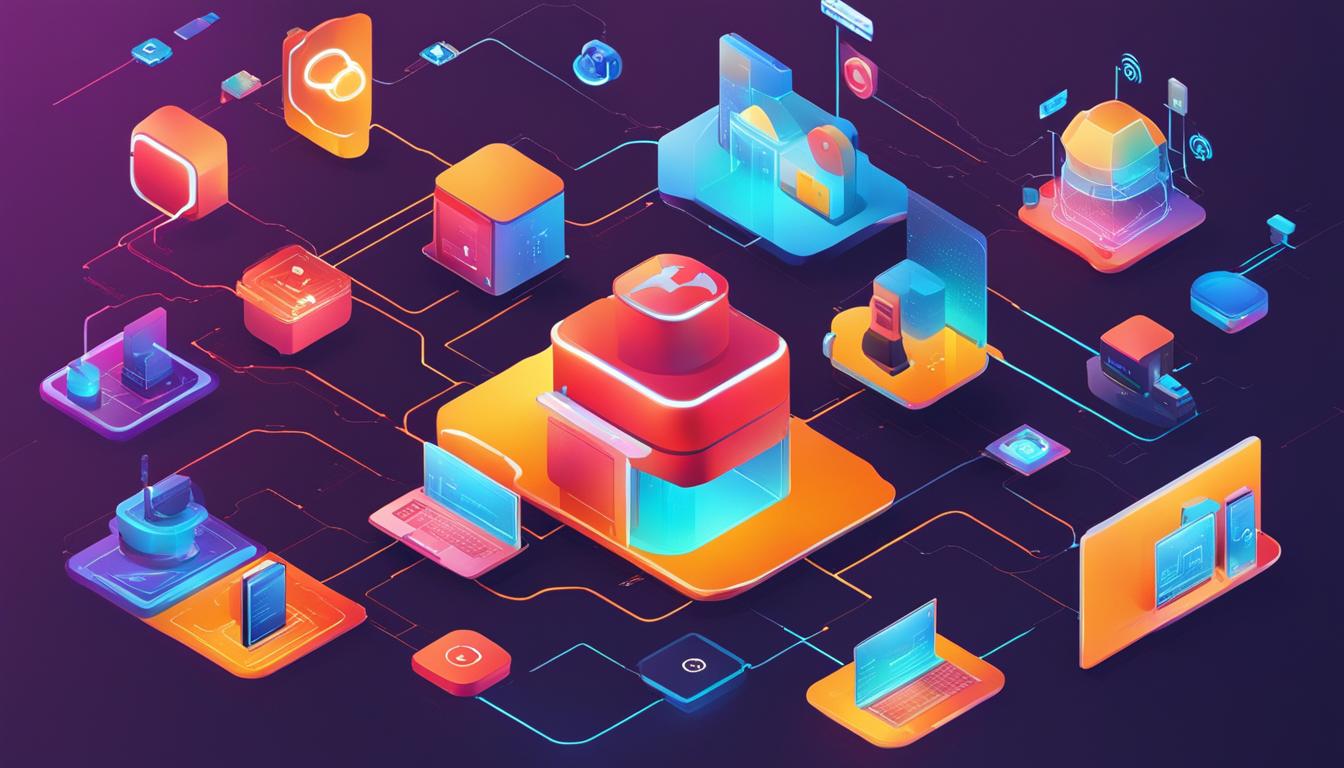The Internet of Things (IoT) has transformed the way we interact with technology, enabling seamless connectivity and automation across various industries. In this rapidly evolving landscape, businesses are increasingly turning to cloud-based IoT platforms to integrate IoT technology into their operations and unlock the full potential of IoT solutions.
The integration of IoT into business processes offers numerous benefits, including improved efficiency, enhanced decision-making, and the ability to create new revenue streams. However, implementing IoT solutions can be complex and challenging without the right platform to support the integration, connectivity, and management of IoT devices and data.
IoT platforms provide the necessary infrastructure, tools, and services to facilitate IoT implementation, enabling businesses to connect and manage their devices, analyze data, and develop innovative IoT applications. These platforms offer robust features such as secure connectivity, real-time data processing, scalability, and seamless integration with existing systems.
By leveraging cloud-based IoT platforms, businesses can accelerate their IoT initiatives, reduce development time and costs, and stay ahead of the competition in this rapidly expanding IoT market.
Key Takeaways:
- Cloud-based IoT platforms are essential for integrating IoT technology into business operations.
- IoT platforms provide connectivity, management, and data analysis capabilities for IoT devices.
- These platforms reduce development time and costs, enabling businesses to tap into the vast potential of the IoT market.
- IoT platforms offer features such as secure connectivity, real-time data processing, and seamless integration.
- Choosing the right IoT platform is crucial for successful IoT implementation and scalability.
Comparison of Top IoT Cloud Platforms
Each IoT cloud platform offers unique features and capabilities. Here is a comparison of some of the top IoT cloud platforms:
- Google IoT: Google provides a robust IoT platform that includes data analytics, machine learning, and cloud connectivity. It offers seamless integration with other Google services and supports a wide range of devices.
- Amazon Web Services (AWS) IoT: AWS IoT offers scalable and secure cloud services for IoT applications. It provides device management, data ingestion, and analytics capabilities, along with integration with other AWS services.
- Microsoft Azure IoT: Azure IoT enables developers to build, deploy, and manage IoT solutions at scale. It offers comprehensive toolsets, advanced analytics, and integration with Azure services.
- Oracle IoT Intelligent Applications: Oracle provides end-to-end IoT solutions that include device management, data streaming, and analytics. It offers pre-built applications for various industries, making it easier to deploy IoT solutions.
- IBM Watson IoT: IBM Watson IoT offers advanced analytics and cognitive capabilities for IoT applications. It enables real-time data analysis, predictive modeling, and integration with IBM’s AI-powered services.
- Salesforce IoT Cloud Connect: Salesforce provides a platform for connecting IoT devices and leveraging customer data for personalized experiences. It offers robust data processing, real-time event monitoring, and integration with Salesforce CRM.
- Cisco IoT Cloud Connect: Cisco offers a secure and scalable IoT cloud platform with networking and infrastructure capabilities. It provides device management, data analytics, and integration with Cisco’s networking solutions.
- ThingsBoard Open-Source IoT Platform: ThingsBoard is an open-source IoT platform that enables developers to build scalable and customizable IoT solutions. It offers device management, data visualization, and rule engine capabilities.
- Particle: Particle provides a comprehensive IoT platform for prototyping and commercial deployment. It offers device management, cloud connectivity, and over-the-air firmware updates.
- IRI Voracity: IRI Voracity is a data management platform with IoT integration capabilities. It enables data ingestion, transformation, and analytics for IoT applications.
- Kaa Enterprise: Kaa Enterprise offers an end-to-end IoT platform with device management, data collection, and analytics features. It supports custom rule engines and integration with external systems.

Key Features to Consider
When evaluating IoT cloud platforms, it is important to consider the following key features:
- Scalability: Does the platform support the number of devices and data volume required for your IoT solution?
- Security: What security measures does the platform have in place to protect your IoT ecosystem?
- Integration: Can the platform integrate with your existing systems and third-party services?
- Analytics: Does the platform provide advanced analytics capabilities for gaining insights from IoT data?
- Device Management: How easy is it to onboard, monitor, and manage IoT devices using the platform?
Considering these factors will help businesses choose the right IoT cloud platform that meets their specific requirements and accelerates their IoT initiatives.
Conclusion
IoT cloud platforms are indispensable for simplifying IoT development and overcoming the challenges faced by developers. These platforms offer a wide range of benefits, including enhanced connectivity, robust security measures, scalability options, and seamless integration capabilities. By leveraging IoT cloud platforms, businesses can significantly reduce development time and costs.
The global IoT market is experiencing rapid growth, with a projected market size of over $2.4 trillion annually by 2027. As the demand for IoT solutions continues to rise, it becomes crucial for businesses to harness the power of IoT technology. IoT cloud platforms empower businesses to improve connectivity, efficiently manage smart devices, and tap into the immense potential of IoT solutions.
With a plethora of IoT cloud platforms available in the market, businesses can choose the platform that best aligns with their requirements and accelerates their IoT initiatives. Whether it’s Google IoT, Amazon Web Services IoT, Microsoft Azure IoT, Oracle IoT Intelligent Applications, IBM Watson IoT, Salesforce, Cisco IoT Cloud Connect, ThingsBoard Open-Source IoT Platform, Particle, IRI Voracity, or Kaa Enterprise – there is a suitable platform available for every business’s unique needs.
By embracing IoT cloud platforms, businesses can unlock new opportunities in the IoT market, drive innovation, and create impactful solutions that revolutionize industries. The future of IoT development lies in these platforms, empowering businesses to harness the full potential of IoT technology and thrive in the ever-evolving digital landscape.
FAQ
What is the role of IoT cloud platforms in IoT development?
IoT cloud platforms play a vital role in simplifying IoT development by providing connectivity, security, scalability, and integration capabilities. They reduce development time and cost, making it easier for developers to create IoT solutions.
How can businesses benefit from IoT cloud platforms?
Businesses can benefit from IoT cloud platforms in several ways. These platforms enhance connectivity, enable effective management of smart devices, and provide the tools and infrastructure required to implement and deploy IoT solutions.
Which are the top IoT cloud platforms available?
The top IoT cloud platforms include Google IoT, Amazon Web Services IoT, Microsoft Azure IoT, Oracle IoT Intelligent Applications, IBM Watson IoT, Salesforce, Cisco IoT Cloud Connect, ThingsBoard Open-Source IoT Platform, Particle, IRI Voracity, and Kaa Enterprise.
What are some of the features and capabilities offered by these IoT cloud platforms?
Each IoT cloud platform offers unique features and capabilities. These include data analytics, device management, security protocols, real-time monitoring, remote control functionality, scalability options, and integration with other systems and technologies.
How can IoT cloud platforms contribute to the growth of the IoT market?
IoT cloud platforms enable businesses to leverage IoT technology effectively, leading to the expansion and growth of the IoT market. These platforms provide the infrastructure and tools necessary for the development and implementation of IoT solutions, driving innovation and opening up new business opportunities.
Are IoT cloud platforms suitable for businesses of all sizes?
Yes, IoT cloud platforms are suitable for businesses of all sizes. They offer scalable solutions that can be tailored to meet the specific requirements of both small startups and large enterprises, enabling them to harness the benefits of IoT technology.
Source Links
- https://dzone.com/articles/10-cloud-platforms-for-internet-of-things-iot
- https://euristiq.com/best-iot-cloud-platforms/
- https://www.devteam.space/blog/what-are-the-best-iot-cloud-platforms/
- Understanding Bitcoin: Your Ultimate Guide to Bitcoin and Altcoins - October 15, 2024
- Introduction to Cryptocurrencies - October 14, 2024
- Bitcoin Mining and Blockchain - October 12, 2024






